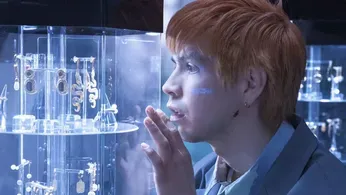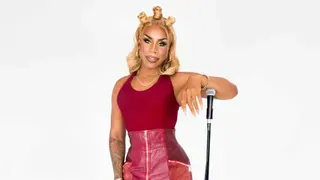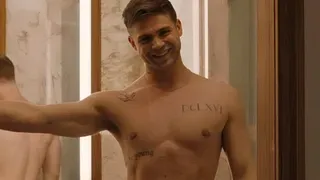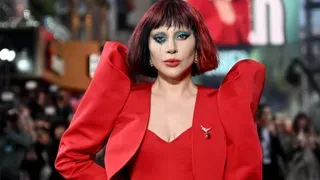
May 24, 2024
EDGE Interview: See What Happens When Julio Torres Loses an Earring on HBO's 'Fantasmas'
Kilian Melloy READ TIME: 8 MIN.
"Fantasmas" (Spanish for "Ghosts") seems an entirely appropriate title for Julio Torres' upcoming six-episode comedy on HBO. As Torres' film "Problemista" did, the show tackles bureaucracy with a mix of absurd humor and sharp-edged satire. But where that film, which co-starred Tilda Swinton, was focused on the tribulations of an immigrant trying to navigate the labyrinthine perils of the US immigration system, "Fantasmas" takes broader aim, critiquing everything from the health care system, to modern notions of fame, to the plights of working people, to the New York metro system. "Problemista" pointed out the talent bureaucracies have for pretending that people don't exist if they don't fit arbitrary rules and requirements; "Fantasmas" interrogates the underpinnings of human existence itself.
The narrative threads of "Fantasmas" spin out to draw an increasingly unlikely group of tangentially related characters into its six episodes, people only loosely connected by Julio's efforts to find a lost earring. That large number of roles makes plenty of space for surprising guest appearances (a number of them queer celebrities), but the show never loses sight of its main plot: Julio is terrified that a birthmark might turn out to be malignant, and, given his lack of "Proof of Existence" credentials, he dreads the prospect of trying to grapple with a health care system (let alone any other bureaucracy). Like Torres, a native of El Salvador, Julio is an immigrant; as a creative person, he feels trapped in a system that prioritizes profits over people.
Julio's assistant and his agent – a robot named Bibo (Joe Rumrill) and a performance artist named Vanesja (Martine) respectively – focus on him only intermittently. More off-the-wall characters include a social media manager that seems like a cousin of "Mr. Bill," the tiny clay man who featured in vintage "Saturday Night Live" skits (fitting, given that Torres used to be a writer on "SNL"); a trainer whose friendship with an aspiring influencer takes a startlingly dangerous turn; and a driver named Chester (Tomàs Matos) who would be right at home in an Almodóvar movie with his own Uber-like ride share service. That's not to mention a multitude of others with whom Julio crosses paths, like a compassionate middle school teacher, a disenfranchised letter of the alphabet, and the toilet bowl water (voiced by none other than Tilda Swinton) he makes a connection with when the chips seem well and truly down... the drain, that is.
EDGE caught up with Julio Torres to hear more about the show, discuss his creative process, and contemplate how representation doesn't just matter; it's inevitably present in his work.
EDGE: "Los Espookys" had a ghostly component, and "Fantasmas" is very surreal. What fascinates you about ghosts and surrealism?
Julio Torres: I don't know. I think that there's something inherently absurd about these fantastical elements, and I enjoy pointing out the absurdity in the mundane bureaucracy and our day-to-day lives. I think that fantastical metaphors are appropriate for that, maybe.
EDGE: Are you anything like your "Los Espookys" character?
Julio Torres: No, I don't think so. Maybe sometimes. I think our eccentricities are sort of similar, but in terms of our personality, I don't think I'm like him. I hope I'm not like him.
EDGE: Watching these episodes it seems like you're taking note of how ordinary people tend to get marginalized and erased by society and social institutions.
Julio Torres: I keep writing characters that are lonely, and that feel very isolated in modern-day society. I think that's where this idea of ghosts came from – we all feel like ghosts in one way or another, and like the world is strange. Growing up, I always connected with characters that were limited in some way – like robots, who could do so much and yet so little. My favorite character growing up was Pinocchio, because he kept wanting to be a real boy. I didn't feel like a real boy.
EDGE: Your character has insights into people, but also ideas, notions, and symbols. I can't help wondering if this show is an outgrowth of your HBO special "My Favorite Shapes."
Julio Torres: In many ways, this show is very similar to "My Favorite Shapes," and as much as I'm showing you different types of people, different types of beings, and they started as absurd and then hopefully they connect in some way – and some of them are just absurd for the sake of being funny.
Kilian Melloy serves as EDGE Media Network's Associate Arts Editor and Staff Contributor. His professional memberships include the National Lesbian & Gay Journalists Association, the Boston Online Film Critics Association, The Gay and Lesbian Entertainment Critics Association, and the Boston Theater Critics Association's Elliot Norton Awards Committee.







